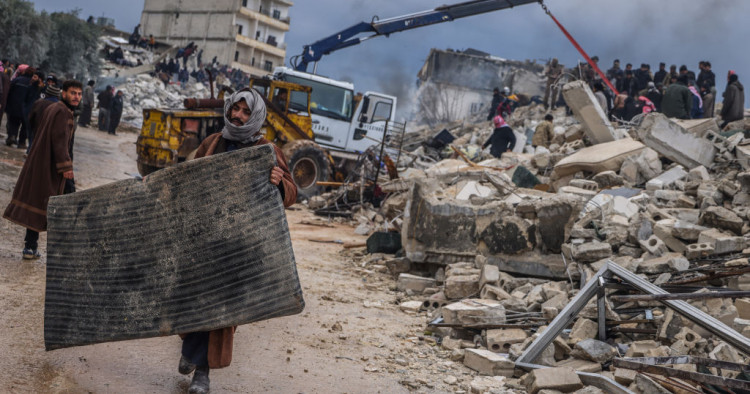Contents:
- Earthquake devastates southern Turkey, brings calamity to war-torn Syria
- International summit convened to address Lebanon’s alarming economic and political deterioration
- Terrorist strike upsets politically polarized Pakistan
- Egypt keeps its diplomatic options open
- The US and Jordan can work closer together on the Israeli-Palestinian issue
- Israeli-Sudanese meetings in Khartoum: Three no’s and one yes (maybe)
Earthquake devastates southern Turkey, brings calamity to war-torn Syria
Charles Lister
Senior Fellow, Director of Syria and Countering Terrorism & Extremism programs
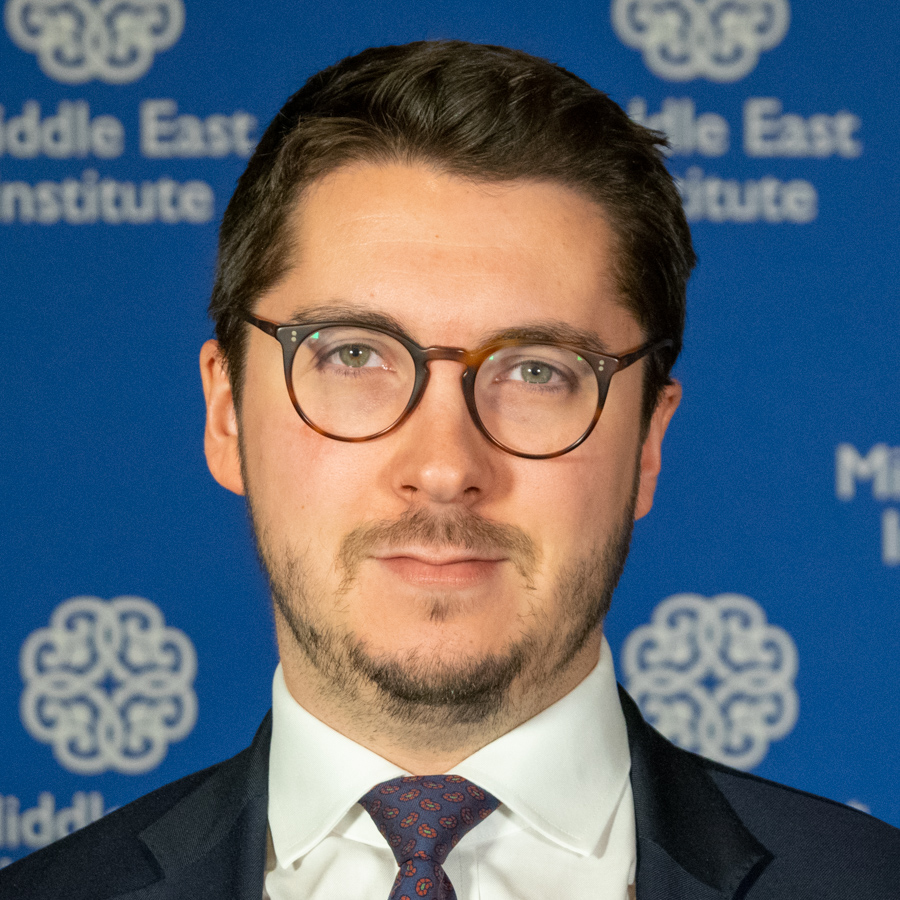
-
At least 2,400 people are known to have perished in southern Turkey and northern Syria as a result of a crippling 7.8 magnitude earthquake, with death tolls rapidly rising.
-
The destruction in Turkey is catastrophic but international support is beginning to flow in; whereas, northern Syria is uniquely vulnerable and poorly positioned to deal with such a natural disaster because of the country’s precipitous economic collapse, severe fuel shortage, harsh winter season, and war-related disruptions to emergency and medical services.
At 4:17 AM, southern Turkey and northern Syria were struck by a crippling 7.8 magnitude earthquake. Twelve hours later, at least 2,400 people were known to have perished, with death tolls rapidly rising. This natural disaster could not have come at a worse time or struck a more vulnerable region — with notoriously poor construction in southern Turkey and the effects of more than a decade of brutal conflict still afflicting northern Syria. As people slept, buildings collapsed — at least 3,450 in Turkey and many hundreds if not thousands more in Syria.
The destruction in Turkey is being described by authorities as befitting a warzone. At the same time, the impact meted out on the Syrian side of the border, by the earthquake and an equally powerful aftershock hours later, has been catastrophic. For northwestern Syria, this earthquake represents an emergency within an emergency — and a crisis within a crisis. The region was already home to the world’s most acute humanitarian crisis, with nearly 3 million internally displaced people (IDP), almost all of whom are entirely dependent on foreign aid. After 12 years of brutal shelling by the Syrian regime, at least 65% of the area’s basic infrastructure was already destroyed or heavily damaged, and the medical and rescue worker sectors have faced years of targeted regime attacks.
According to contacts on the ground, every village, town and city district has suffered mass destruction. Thousands of civilians are thought to be trapped under rubble — many of whom can be audibly heard screaming for help. Rescue workers, opposition fighters and civilians are all desperately seeking to help. Every major hospital or medical clinic has reached capacity, with patients being treated on floors, in hallways and outside in the winter cold. In one town alone, in al-Atareb in Aleppo’s western countryside, nearly 100 dead bodies have been recovered.
Prior to the earthquake, northwestern Syria’s IDP camps were already far beyond capacity, but the scale of destruction caused overnight will inevitably see those camps swell. This will require a substantial ramping up of the United Nation’s emergency humanitarian aid mission, with an emphasis on shelter, food, and crisis healthcare. In the midst of a harsh winter, combined with Syria’s precipitous economic collapse and severe fuel shortage, it is hard to imagine a region more vulnerable and less well positioned to deal with such a natural disaster.
While the international community mobilizes to assist Turkey’s disaster needs, the ability to do so for northern Syria’s most vulnerable is highly complex. After years of Russian vetoes and both military and diplomatic pressure, the U.N.’s aid mission in the region is restricted to just one border crossing from Turkey. Moreover, that U.N. effort is designed for humanitarian assistance — not disaster relief and emergency rescue. Already, some activities along the border have been hampered by the earthquake, with a long-standing arrangement between Turkey and Syrian opposition authorities to evacuate emergency medical cases to Turkish hospitals coming to an abrupt stop overnight. Syria’s famed White Helmets, staffed by 3,000 volunteers, have deployed in full, but they are reportedly running out of diesel to operate their heavy equipment. U.N. aid facilities on the Turkish border were also hit and damaged by the earthquake.
It is unclear how precisely a major international disaster relief effort can take shape in northwestern Syria; however, only a concerted and immediate push by the United States and allies will make anything feasible. Making use of the existing U.N. aid mission and Turkish facilitation would allow a platform upon which to build, but the scale of the needed response is huge. Syria’s people have been abandoned and forgotten too many times and for too long — we cannot leave them alone again.
This brief was originally published as a stand-alone article, here.
Follow on Twitter: @Charles_Lister
International summit convened to address Lebanon’s alarming economic and political deterioration
Fadi Nicholas Nassar
U.S.-Lebanon Fellow
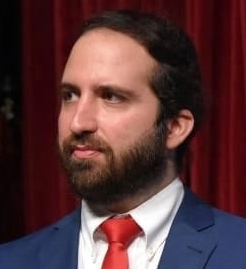
-
Paris is hosting a multi-party diplomatic summit on Lebanon that includes the United States, France, Saudi Arabia, Qatar, and Egypt.
-
Lebanon is in its fourth year of crisis and, for the first time in its history, the country lacks a president and government.
Diplomats from the United States, France, Saudi Arabia, Qatar, and Egypt are meeting in Paris this Monday to discuss the alarming deterioration of Lebanon’s four-year crisis.
Over the past few weeks, Lebanon has fallen further into the bottomless pit of its seemingly intractable crisis and is on the precipice of collapsing into a failed state. The national currency lost more than 95% of its value since the start of the crisis in 2019, and a recent surge in hyperinflation is spiraling so rapidly that prices for basic goods like food and gas have to be set daily. With more than 80% of Lebanese and 90% of refugees living in poverty, Lebanon is also without a president or government, undermining the prospects of any credible implementation of reforms required for a deal with the International Monetary Fund (IMF) that could potentially mitigate the ruinous situation. Already-crumbling pillars of the state, like the judiciary, are on the verge of ruin as typified by the implosion of the investigation into the deadly 2020 Port of Beirut blast.
As the quintet deliberates in Paris, the view from Beirut is bleak. Lebanon is entering a new phase of its devastating predicament; and without meaningful international support, it will likely degrade into a failed state. But what does that support look like? Four years into the crisis, it is clear — Lebanon is collapsing from within, but international efforts largely focused on containing its symptoms rather than addressing its root causes are not sustainable.
Diplomats in Paris are likely to agree: Lebanon needs a president. Lebanon needs a government. Lebanon needs to implement IMF reforms and stabilize its monetary crisis. But if the Paris meeting is to have meaningful impact on halting Lebanon’s unraveling and help put it on the path toward recovery and reform, it must demonstrate robust international support for accountability for both the economic and political components of Lebanon’s crisis. Sacrificing one for the other only leads to failure as the past four years have shown.
Lebanon needs a government and president that can implement the reforms capable of fighting corruption and recapturing the state. Failure to tackle these so far have not only bankrupted the state but also undermined its sovereignty and normalized political violence and coercion. But Lebanon cannot do this alone.
Follow on Twitter: @dr_nickfn
Terrorist strike upsets politically polarized Pakistan
Marvin G. Weinbaum
Director, Afghanistan and Pakistan Studies

-
Last week’s deadly Peshawar blast, claimed by a faction of the TTP, brought fears of a new wave of insecurity for Pakistan.
-
The attack on a heavily attended mosque has further highlighted the deep chasm that blights the country’s politics, as former Prime Minister Khan accuses the government of purportedly intending to exploit the security situation.
Pakistan is still reeling from last week’s bombing in the northwest city of Peshawar that took more than 150 lives and injured scores of people, mainly police and other government employees. The Jan. 30 attack on a heavily attended mosque in a highly fortified section of the city was claimed by a faction of the terrorist Tehreek-e-Taliban (TTP). Violence is no stranger to Peshawar, which lies less than 20 miles from the Afghan-Pakistani frontier. But after government security forces drove TTP militants across the border in 2014, the city along with the rest of the country for a time enjoyed a respite from bombings, assassinations, and other terrorist acts. That began to change following the Afghan Taliban’s takeover in Kabul a year and a half ago. Encouraged by their Afghan cousins’ successful insurgency, Pakistan’s resurgent Taliban gradually infiltrated the country’s tribal region and the settled areas with several thousand fighters. Peace talks fostered by the Kabul government and a Pakistan open to a political solution to the insurgency bought time for the TTP to regroup its forces. But as talks petered out and a truce formally ended in late November, there followed a sharp uptick in violence. The TTP claims to have staged more than 150 terrorist attacks over the last three months across Pakistan’s Khyber Pakhtunkhwa Province (KPP).
The Peshawar blast has brought fears of a new wave of insecurity in Pakistan and raised questions about the country’s counterterrorism capabilities and strategies. The audacious terrorist strike was reminiscent for most Pakistanis of another Taliban attack aimed directly at unnerving the country’s security establishment. In December 2014, militants in Peshawar entered an army-run school and massacred 147 children, an act so revolting that it won over previously reluctant elected officials and a wide segment of the public to a military campaign that flushed out the Taliban along the tribal belt. It can now be asked whether this latest tragedy might similarly unify the country against the TTP, this time behind military operations fully aimed at crushing the group, even its encampments in Afghanistan.
Answers to that question became clearer several days ago. During a high-profile meeting in Peshawar on Friday, Prime Minister Shahbaz Sharif appealed for a national consensus on a zero- tolerance policy against terrorism and an “unflinching resolve to protect the people of Pakistan at any cost.” He has called for convening an All-Parties Conference, and there is talk of strengthening the country’s legislated National Action Plan, meant to provide the tools to deal with terrorism. Fears of terrorism have given the prime minister an opportunity for his largely paralyzed government to exercise leadership. He has also used the occasion to score political points by blaming the previous Pakistan Tehreek-e-Insaf (PTI) government of Imran Khan for policies that allowed a resurgence of violent extremism in the country.
Deposed former Prime Minister Khan differs with the current government in both substance and tone on Pakistan’s Taliban. While denouncing the Peshawar bombing, Khan shows none of Sharif’s resolve. He appears to be justifying the TTP’s existence by blaming Pakistan’s post-9/11 military operations in the tribal belt that were launched in conjunction with the United States’ Global War on Terrorism. Rather than backing measures to take down the Pakistani Taliban, he has endorsed TTP demands for the military’s withdrawal from the tribal areas as part of a peace settlement. To rally supporters against the government, Khan is staging marches across the KPP and accuses the Sharif government of using the latest security issue to postpone soon-scheduled assembly elections in both the Khyber Pakhtunkhwa and Punjab provinces. Clearly, rather than unifying the country, last week’s terrorism has instead succeeded in further highlighting the deep chasm that blights Pakistan’s highly polarized politics.
Research assistant Naad-e-Ali Sulehria contributed to this piece.
Follow on Twitter: @mgweinbaum
Egypt keeps its diplomatic options open
Mirette F. Mabrouk
Senior Fellow and Founding Director of the Egypt program
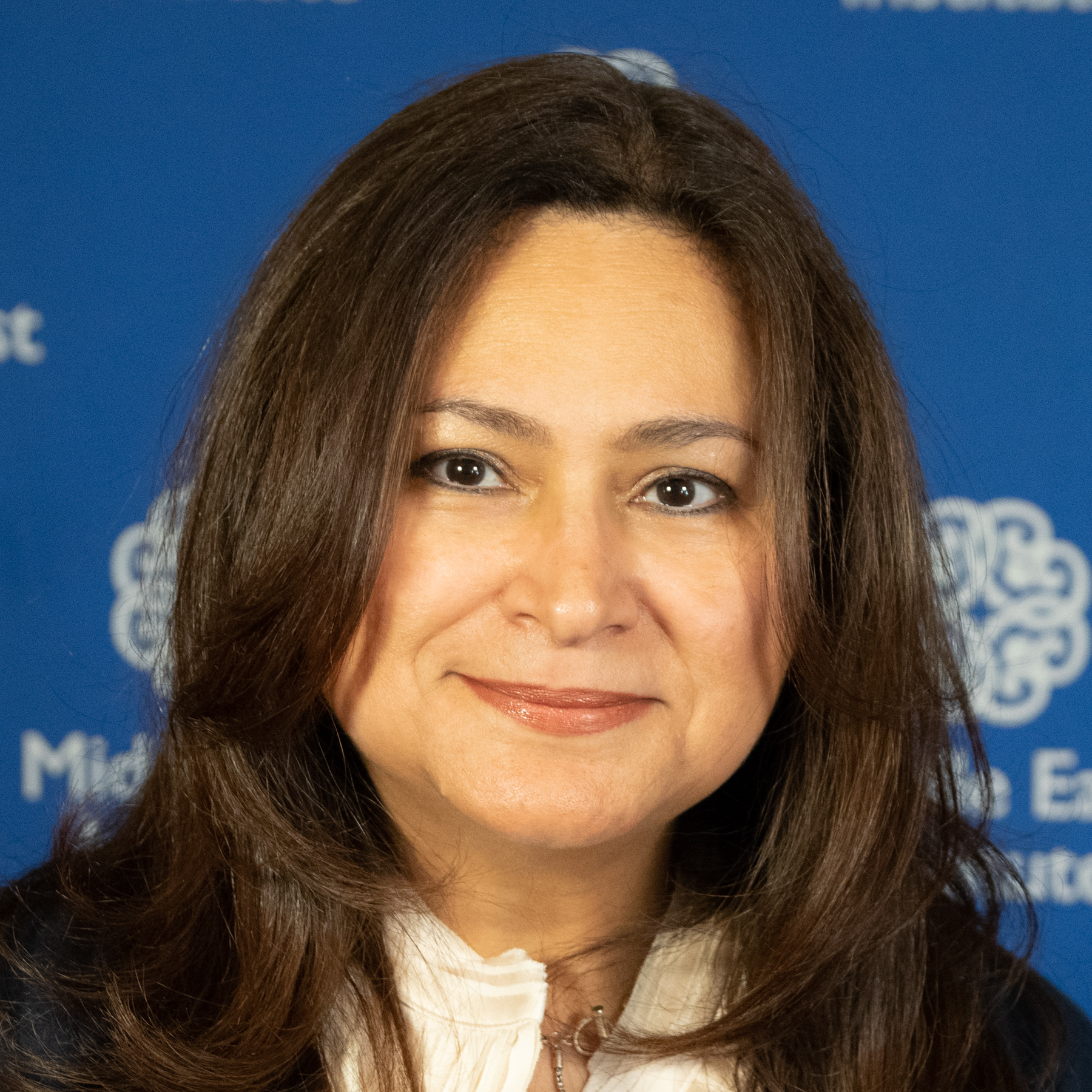
-
Secretary of State Blinken declared U.S. support for the latest IMF loan to Egypt but also stressed the need for it to be implemented.
-
After Blinken’s visit, the Egyptian foreign minister traveled to Moscow, illustrating how changing and escalating challenges are making regional relationships and alliances ever more fluid and adaptable, with countries like Egypt taking new stock of both individual and regional priorities.
Secretary of State Antony Blinken touched down in Cairo last week, on Jan. 30, for a three-day visit, part of a Middle East tour that included Tel Aviv and Ramallah. The trip was far from routine, however, since it, occurred in the middle of escalating Israeli-Palestinian violence further complicated by a new, far-right Israeli government.
The Israeli-Palestinian issue figured prominently on Blinken’s to-do list throughout his visit, including in his meetings with Egyptian President Abdel Fattah el-Sisi and Foreign Minister Sameh Shukry. The top American diplomat reiterated the consistent U.S. call to maintain calm on both sides. According to a statement by Egyptian presidential spokesperson Bassam Radi, following Blinken’s meeting with Sisi, “Washington is counting on close coordination with Cairo to restore stability, achieve calm, and contain the situation between the Palestinians and Israelis.”
Traditionally, Egypt, with solid relationships on both sides, has had success in mediating between the Israelis and the Palestinians thanks to the fact that it has maintained solid relationships on both sides of the conflict. This initiative has been important for regional security but also for Egypt’s international clout. In turn, while in Cairo, Blinken repeated the Biden administration’s commitment to the two-state solution (a prospect currently more akin to a mirage than an actual possibility) and called for a de-escalation of the violence.
During their meeting, Sisi and Blinken reaffirmed both countries’ “strong commitment to the U.S.-Egypt strategic partnership.” The relationship is occasionally fractious but still mutually advantageous to both. And Blinken took time to highlight aspects of U.S. support, including policies to improve food security, funding from the U.S. Agency for International Development (USAID) for a Red Sea coral reef protection initiative, and financing for an undersea telecommunications cable. He also stressed U.S. support for human rights and for the latest loan from the International Monetary Fund and the associated reform program. He was, however, pointed about the need for it be put into action.
Blinken’s visit also resulted in a diplomatic relay race. Following the U.S. official’s departure, Shukry flew to Moscow for talks with his Russian counterpart, Sergei Lavrov, during which he passed on a message from Washington on Ukraine.
Lavrov’s stance on Blinken’s message might have been non-comital — he referred to it as “incomplete” — but he firmly praised Egypt’s “balanced” position on the Russo-Ukrainian war; Cairo has consistently called for a negotiated political resolution. While a resolution would be universally beneficial, it is especially important for developing countries, which have experienced exacerbated food insecurity at home due to the war’s global impact.
Lavrov was also keen to emphasize other aspects of Egyptian-Russian cooperation. The long-planned Dabba nuclear plant, to be built by Rosatom, has been languishing since 2015; but it received new impetus since the Russian re-invasion of Ukraine last year. Moreover, Moscow is dangling before Cairo the tantalizing prospect of increased wheat shipments.
The U.S.-Egyptian and Russian-Egyptian meetings in and of themselves were generally routine, but their relevance is more significant. Egypt is keeping its international options open, and it isn’t alone in doing so. Ever-changing, and escalating challenges have meant that regional relationships and alliances have become more fluid and more adaptable, with countries taking new stock of both individual and regional priorities. That, in turn, has meant that countries that had formerly taken certain relationships for granted are having to consistently re-evaluate their policies. It’s likely that the race for influence will depend on which nations are most adaptable.
Follow on Twitter: @mmabrouk
The US and Jordan can work closer together on the Israeli-Palestinian issue
Nimrod Goren
Senior Fellow for Israeli Affairs

-
Jordan is a like-minded partner for the U.S. when it comes to preventing an escalation of the Israeli-Palestinian conflict and advancing a two-state solution.
-
The two countries can work together to ease Israeli-Palestinian tensions, formulate a new international conflict resolution grouping, encourage an updating of the Arab Peace Initiative, and establish an Israeli-Jordanian crisis-management mechanism.
King Abdullah II bin Al-Hussein's White House visit on Feb. 2 reflected that Jordan is a like-minded partner for the United States when it comes to preventing an escalation of the Israeli-Palestinian conflict and advancing a two-state solution.
The visit took place amidst a rise in violent incidents between Israelis and Palestinians. Both Washington and Amman have voiced concerns about Israeli Prime Minister Benjamin Netanyahu’s new government, each for its own reasons. There are several concrete next steps that the two countries can now take to follow up on the visit and promote stability, peacemaking, and regional cooperation.
The U.S. and Jordan should prepare for the sensitive overlap between Ramadan and Passover this coming April by coordinating their efforts, dividing the labor, and utilizing their leverage over Israel and the Palestinian Authority, respectively, to lower the risk of escalation.
They should also work to bring together international actors willing to invest political capital in dealing with the Israeli-Palestinian issue. The Middle East Quartet, composed of the U.S., Russia, the European Union and the United Nations, has not been effective for years, and a new multilateral mechanism is needed, even if informally at first.
Jordan can bring on board France, Germany and Egypt — its partners in the Munich Group (which has convened periodically since 2020 to maintain the prospects for a two-state solution). Whereas, the U.S. can invite its Quartet allies — the EU and the U.N. Switzerland and Norway, whose special envoys to the region recently visited Jerusalem, can also be incorporated, alongside Turkey — given its recent rapprochement with Israel and good relations with the Palestinians.
At the regional level, the U.S. should respect Jordan’s decision to stay out of the Negev Forum until there is progress on the Israeli-Palestinian track. In the meantime, it should make sure that the interests of Jordan and the Palestinians are considered during the upcoming Negev Summit, planned for March in Morocco. Additionally, Washington should link Jordan and the Palestinians as much as possible to regional projects enabled by the Abraham Accords.
The U.S. can also encourage Jordan and Saudi Arabia to work together on updating the Arab Peace Initiative, bringing it in line with recent regional developments and making it a more effective incentive for peace. Amman played a key role in the drafting of the initiative over 20 years ago, and it may want to do so again. The Saudis emphasize their commitment to the initiative and notably convened a multilateral gathering toward updating it on the sidelines of the 2022 U.N. General Assembly.
Finally, the U.S. can assist Israel and Jordan to put in place a crisis-management mechanism that will enable the two neighbors to deal effectively with the consequences of any Israeli-Palestinian escalation and prevent the collapse of their bilateral ties.
Follow on Twitter: @GorenNimrod
Israeli-Sudanese meetings in Khartoum: Three no’s and one yes (maybe)
Mark A. Heller
Non-Resident Scholar
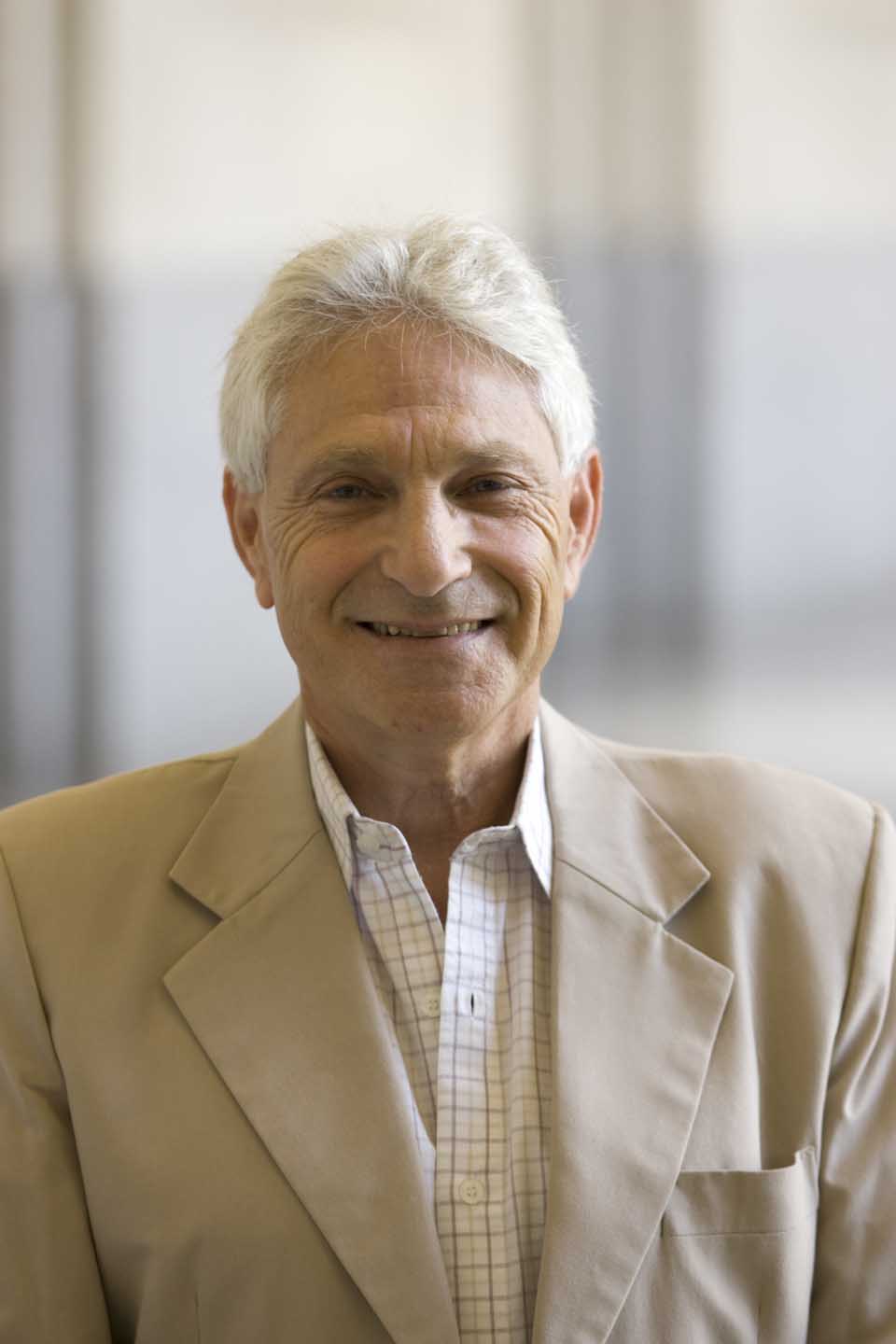
-
Despite an Israeli-Sudanese declaration of intent to normalize relations and reach a peace agreement by the end of 2023, multiple obstacles justify some skepticism about whether rhetoric will become reality.
-
Still, both sides have an interest in making it work; and if it does, this add-on to the Abraham Accords will again demonstrate that Israeli-Arab ties are no longer hostage to a resolution of the Israeli-Palestinian conflict.
Following a low-profile meeting in Khartoum, on Feb. 2, with the head of the Sudanese military regime, Abd al-Fatah al-Burhan, Israeli Foreign Minister Eli Cohen declared that the two sides had discussed the outlines of a normalization of relations by the end of 2023 and thereby laid the foundations “for a historic peace agreement.” Some skeptics may have noted that the pronouncement came on American Goundhog Day. This would not be an entirely inappropriate observation, since similar intentions about the future of Israeli-Sudanese ties were proclaimed in late 2020, following the signing of the Abraham Accords, only to be put on hold. True, the Sudanese commitment this time was given directly to an Israeli official rather than to an American intermediary. Nevertheless, the strategic significance of this latest alleged breakthrough should not be overestimated.
First of all, implementation of the Sudanese commitment is contingent on a transition to civilian rule in that country, meaning that the deadline may well be missed by weeks, or months, or years. Second, even if there is eventually a signing ceremony, there is currently little to suggest that it will be the capstone of a lengthy if surreptitious process of warming ties with Israel or the precursor of even more intimate relations afterward, as was the case with Bahrain, the United Arab Emirates, or Morocco.
Of course, skepticism can be overdone. Both parties have reasons to promote the promised outcome. Sudan has a strong interest in securing the renewal of American aid (similarly contingent on the restoration of civilian rule in Khartoum), but it would also benefit from enhanced access to Israeli technology and investment — and not only in the security field.
As for Israel, last week’s event is important, not just symbolically, because it took place in the Sudanese capital, the site of the Arab League’s bombastic “three no’s” — no peace, no recognition, no negotiations — immediately after the 1967 Six-Day War. Beyond that, Israel has an interest in helping to ensure that Sudan does not fall back into the clutches of Iran, with which it was tightly entangled until the middle of the last decade. No less important, Cohen’s trip reinforces the increasingly evident compartmentalization of the Palestinian issue, even after the installation of a hard-right Israeli government, and seems to affirm the claim of its leading elements that the road to Israeli-Arab peace does not go through the Palestinians. Palestinian-Israeli relations are still obviously critical to Palestinians and Israelis; but barring some inordinately foolish and provocative action by Israel, those relations will apparently no longer dictate or even impinge on the peaceful evolution of Israeli ties with at least some other Arab states. In this sense, the “breakthrough” with Sudan is yet another confirmation of the end of the Arab-Israeli conflict and the transformation of the Palestinian issue from international strategic concern to one of international social work.
Photo by Anas Alkharboutli/picture alliance via Getty Images
The Middle East Institute (MEI) is an independent, non-partisan, non-for-profit, educational organization. It does not engage in advocacy and its scholars’ opinions are their own. MEI welcomes financial donations, but retains sole editorial control over its work and its publications reflect only the authors’ views. For a listing of MEI donors, please click here.













